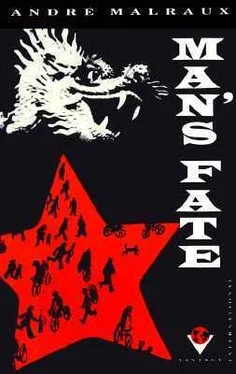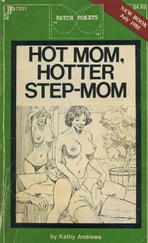Andre Malraux - Man's Fate
Здесь есть возможность читать онлайн «Andre Malraux - Man's Fate» весь текст электронной книги совершенно бесплатно (целиком полную версию без сокращений). В некоторых случаях можно слушать аудио, скачать через торрент в формате fb2 и присутствует краткое содержание. Год выпуска: 1990, Издательство: Vintage, Жанр: Современная проза, на английском языке. Описание произведения, (предисловие) а так же отзывы посетителей доступны на портале библиотеки ЛибКат.
- Название:Man's Fate
- Автор:
- Издательство:Vintage
- Жанр:
- Год:1990
- ISBN:нет данных
- Рейтинг книги:3 / 5. Голосов: 1
-
Избранное:Добавить в избранное
- Отзывы:
-
Ваша оценка:
- 60
- 1
- 2
- 3
- 4
- 5
Man's Fate: краткое содержание, описание и аннотация
Предлагаем к чтению аннотацию, описание, краткое содержание или предисловие (зависит от того, что написал сам автор книги «Man's Fate»). Если вы не нашли необходимую информацию о книге — напишите в комментариях, мы постараемся отыскать её.
As a study of conspiracy and conspirators, of men caught in the desperate clash of ideologies, betrayal, expediency, and free will, Andre Malraux's novel remains unequaled.
Man's Fate — читать онлайн бесплатно полную книгу (весь текст) целиком
Ниже представлен текст книги, разбитый по страницам. Система сохранения места последней прочитанной страницы, позволяет с удобством читать онлайн бесплатно книгу «Man's Fate», без необходимости каждый раз заново искать на чём Вы остановились. Поставьте закладку, и сможете в любой момент перейти на страницу, на которой закончили чтение.
Интервал:
Закладка:
It was becoming possible to employ Chiang Kai-shek. The present government signified nothing, except by its strength (which it lost by the defeat of its army) and by the fear which the Communists of the revolutionary army inspired in the bourgeoisie. Very few people had any interest in its maintenance. Behind Chiang there was a victorious army, and the whole Chinese petty bourgeoisie.
“Nothing else?” he asked aloud.
“Nothing, Monsieur Ferral.”
“Thank you.”
He went do'wn the stairs, met half-way down an au- bum-haired Minerva in a tailored sport-suit, with superb immobile features. She was a Russian from the Caucasus who was reputed to be Martial's occasional mistress. “I’d like to see the expression on your face when you’re making love,” he thought.
“Pardon me, Madam.”
He passed her with a bow, climbed into his car which began to be swallowed up in the crowd, against the current this time. The horn shrieked in vain, powerless against the force of the exodus, against the seething thousands which invasions stir before them. Petty merchants with their two trays dangling like scales from beams that caught and swung wildly, carts, barrows worthy of the T’ang emperors, invalids, cages. Fer- ral was advancing in the opposite direction to all those eyes which fear caused to look inward: if his checkered life was to be destroyed, let it be in this uproar, amid this frantic despair that came beating against the windows of his car! Just as he would have meditated upon the meaning of his life had he been wounded, so now that his enterprises were menaced he was meditating upon them. He realized, moreover, where he was vulnerable. He had had too little choice in this combat; he had been obliged to undertake his Chinese affairs to give new outlets to his production in Indo-China. He was playing a waiting game here: he was aiming at France. And he could not wait much longer.
His greatest weakness lay in the absence of a State. The development of such vast affairs was inseparable from governments. Since his youth he had always worked for them: while stiil in Parliament he had been president of the Society of Electrical Energy and Appliances, which manufactured the electrical equipment of the French State; he had next organized the reconstruction of the port of Buenos Ayres. Possessing the kind of arrogant integrity which refuses commissions and accepts orders, he had looked to the French possessions in Asia for the money he needed after his fall: for he did not intend to play the same game again; he was going to change the rules. In a position to utilize his brother’s personal standing, which was superior to his office as director of the Mouvement General des Fonds Ferral-who had remained at the head of one of the powerful French financial groups-succeeded in getting the General Government of Indo-China to undertake a pro-
1 A depa^ment in the Ministry of Finance charged with the distribution of State funds.
gram of public works involving an expenditure of four hundred million francs. (Even his enemies were not averse to furnishing him means of getting out of France.) The Republic could not refuse the brother of one of her highest officials the management of this civilizing program; it was a great success, and caused surprise in this country in which even big financial ventures are carried on haphazardly.
Ferral knew how to act. A good deed is never lost: the group passed on to the industrialization of IndoChina. Little by little there appeared: two credit establishments (land securities and agricultural loans); four agricultural development associations-rubber, cotton, and sugar plantations and tropical cultures-controlling the immediate conversion of these raw materials into manufactured products; three mining associations: coal, phosphates, gold, and a subsidiary salt-mining enterprise; five industrial firms: light and energy, electricity, glass, paper, printing; three transport companies: barges, tugboats, street cars. At the center, the Public Works Cor- poration-queen of this vast organization of effort, hatred and paper, mother or midwife of almost all the sister societies engaged in living by profitable incests-was able to obtain the contract for the construction of the Central Annam railroad, whose tracks (who would have thought it?) passed through the greater pan of the concessions of the Ferral group. “Things aren’t going so badly,” the vice-president of the administration council would say to Ferral, who said nothing, busy piling up his millions in steps on which he could climb to a position that would put Paris within his reach.
Even with the project for a new Chinese Company in each pocket, he thought only of Paris. It was his dream to return to France rich enough to buy the agence
Havas 1 or to negotiate with it; to get back into the political game and, having cautiously reached the cabinet, to pit the combined forces of the cabinet and a bought public opinion against the Parliament. There lay the power. But today his dreams were out of the question: the rapid growth of his Indo-Chinese enterprises had involved the entire Ferral group in the commercial penetration of the Yangtze basin, Chiang Kai-shek was marching- on Shanghai with the revolutionary army, the crowd, more and more dense, was pressing against his doors. There was not a single company owned or controlled in China by the Franco-Asiatic Consortium which was not affected: those for naval constructions, at Hong Kong, by the insecurity of navigation; aU the others- public works, constructions, electricity, insurance, banks — by war and the Communist menace. What they imported remained in their warehouses in Hong Kong or Shanghai; what they exported, in their Hankow warehouses, sometimes on the wharves.
The car stopped. The silence-Chinese crowds are usually among the noisiest-seemed to forbode the end of the world. A cannon-shot. The revolutionary army, so near? No: it was the noon-day cannon. The crowd scattered: the car did not move. Ferral seized the speaking-tube. No answer: the chauffeur, the valet were gone.
He remained motionless-stupefied-in the motionless car which the crowd circled clumsily. The nearest shopkeeper came out, carrying on his shoulder an enormous shutter; he turned round, nearly smashed one of the glass panes of the car: he was closing his shop. To the right, to the left, ahead of him, other shopkeepers, other artisans came out, with shutters covered with characters on their shoulders. The general strike was beginning.
1 The leading French news-gathering and publicity syndicate.
This time it was not the Hong Kong strike, slowly set under way, epic, dismal: it was an army maneuver. As far as his eye could reach there was not a shop remaining open. He must leave as quickly as possible; he got out, called a rickshaw. The coolie did not answer him: he was running at top speed for shelter, almost alone on the street, now, with the abandoned car: the crowd had just surged back towards the sidewalks. “They’re afraid of the machine-guns,” thought Ferral. The children, no longer playing, were scurrying between legs, through the swarming agitation of the sidewalks. A silence full of lives at once remote and very near, like that of a forest saturated with insects; the siren of a cruiser rose, then became lost. Ferral walked towards his house as fast as he could, hands in pockets, shoulders and chin thrust forward. Two sirens took up in unison, an octave higher, the cry of the one that had just died down, as if some enormous creature, enveloped in this silence, were thus announcing its coming. The entire city was on guard.
One o’clock in the afternoon
“Five minutes to,” said Ch’en.
The men of his group were waiting. They were all spinning-mill workers, clad in blue denim; he wore their garb. All of them shaved, all lean, all vigorous: before Ch’en, death had made its selection. Two were holding rifles under one ^m, the barrels towards the ground. Seven carried revolvers from the Shantung; one, a grenade; a few others had some hidden in their pockets. About thirty held knives, clubs, bayonets; eight or ten, without weapons, were crouched beside piles of rags, kerosene cans, rolls of wire. An adolescent was examining large broad-headed tacks which he pulled out of a sack as though they were seeds: “Surely longer than horse-shoes. ” A Court of Miracles,1 but composed of men united by a bond of hatred and decision.
Читать дальшеИнтервал:
Закладка:
Похожие книги на «Man's Fate»
Представляем Вашему вниманию похожие книги на «Man's Fate» списком для выбора. Мы отобрали схожую по названию и смыслу литературу в надежде предоставить читателям больше вариантов отыскать новые, интересные, ещё непрочитанные произведения.
Обсуждение, отзывы о книге «Man's Fate» и просто собственные мнения читателей. Оставьте ваши комментарии, напишите, что Вы думаете о произведении, его смысле или главных героях. Укажите что конкретно понравилось, а что нет, и почему Вы так считаете.











